BUS5KMS: Knowledge Management Systems - Thailand Flood Case Study
VerifiedAdded on 2023/06/12
|12
|3085
|207
Case Study
AI Summary
This case study examines knowledge management (KM) structures utilized during the Thailand flood crisis, drawing from a Computers in Human Behavior case study. It explores KM tools and techniques, KM models and processes, organizational learning, knowledge sharing, communities of practice, innovation, knowledge creation, organizational culture, governance, and memory. The study critically discusses these aspects in relation to the case study organization, comparing implementation outcomes against KM principles discussed in lectures for BUS5KMS - Knowledge Management Systems. It highlights the role of knowledge retention tools, knowledge mapping, and the SECI model in new knowledge creation, emphasizing the importance of organizational culture and memory in effective KM. The analysis also addresses information and content governance, the focus on outcomes, changes in workforce behaviors, and the significance of explicit knowledge within the organization.
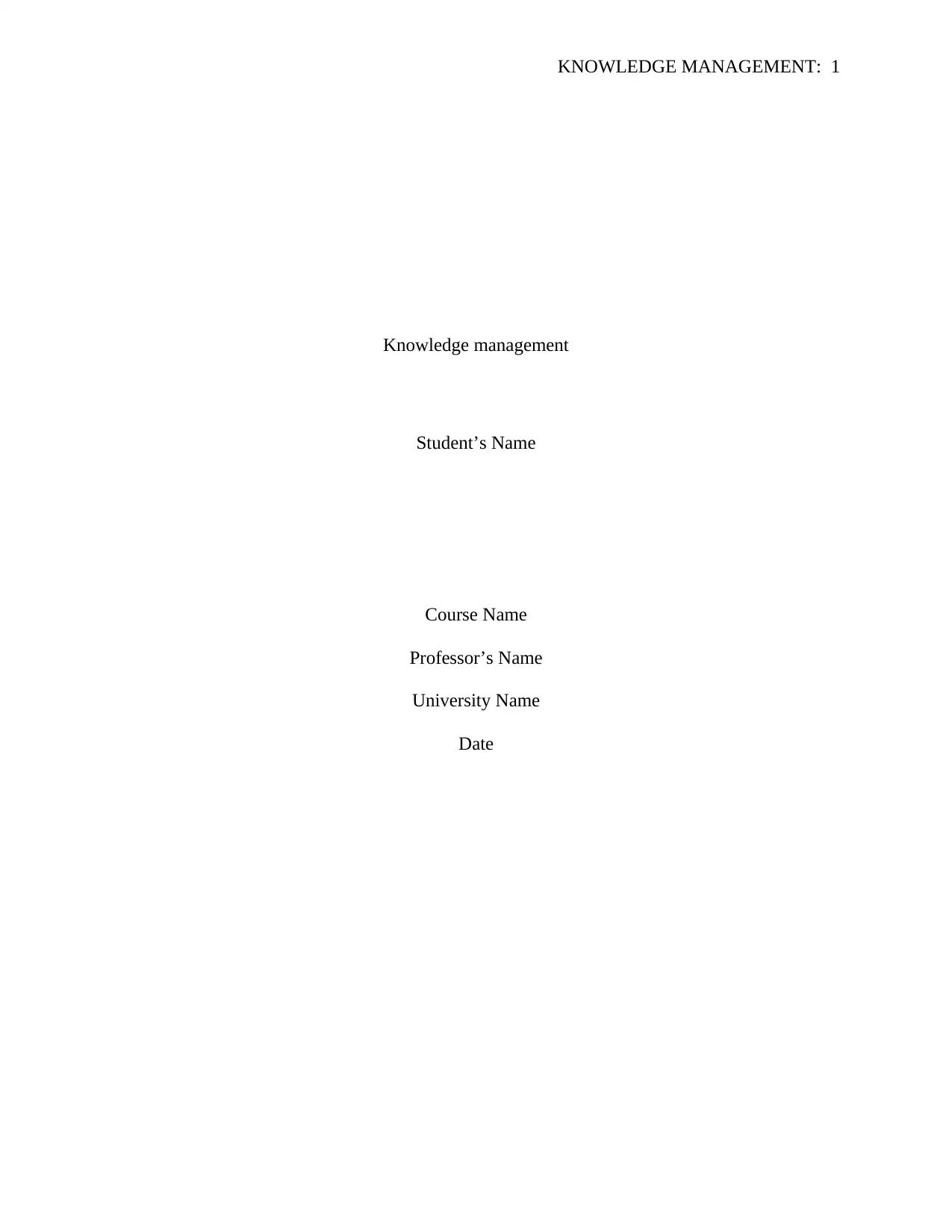
KNOWLEDGE MANAGEMENT: 1
Knowledge management
Student’s Name
Course Name
Professor’s Name
University Name
Date
Knowledge management
Student’s Name
Course Name
Professor’s Name
University Name
Date
Paraphrase This Document
Need a fresh take? Get an instant paraphrase of this document with our AI Paraphraser
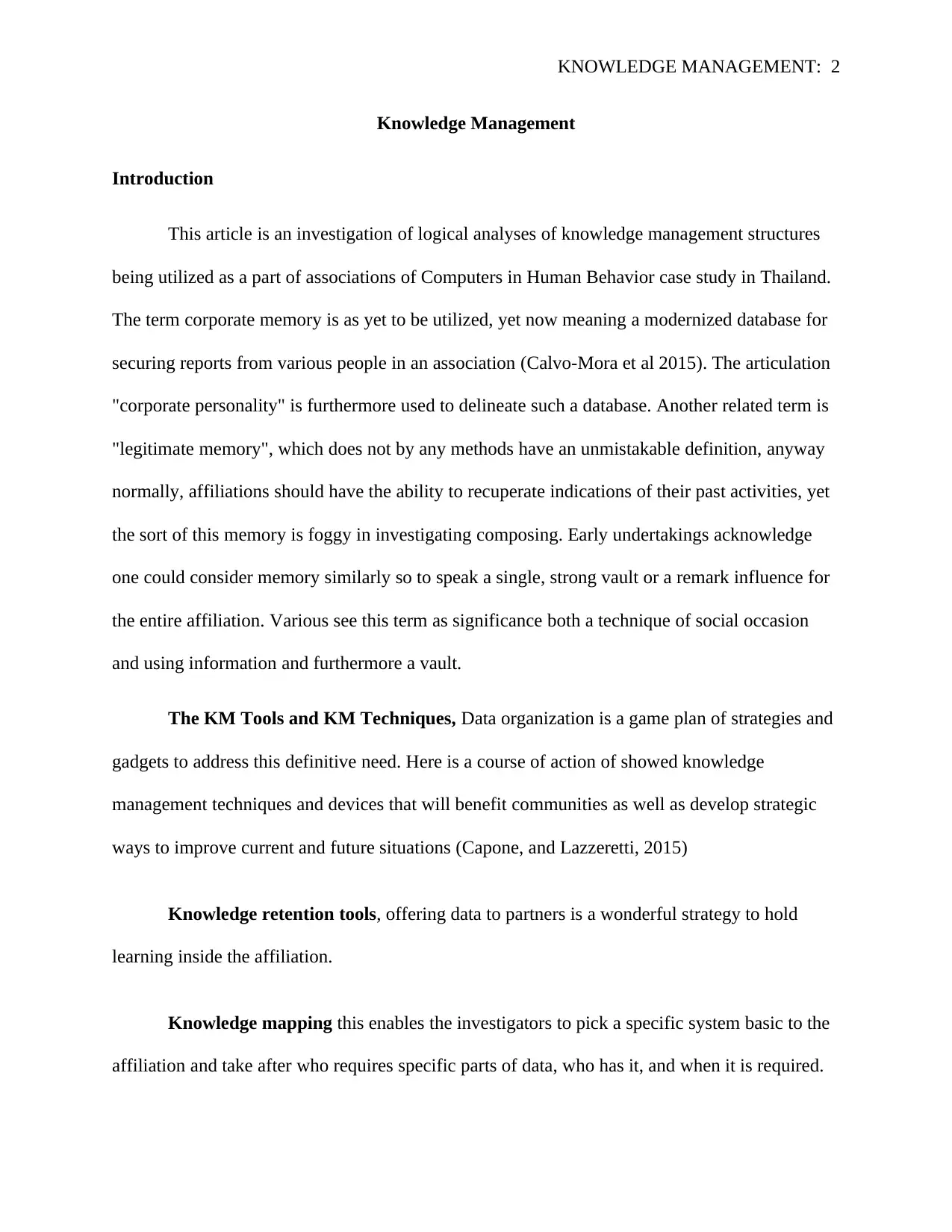
KNOWLEDGE MANAGEMENT: 2
Knowledge Management
Introduction
This article is an investigation of logical analyses of knowledge management structures
being utilized as a part of associations of Computers in Human Behavior case study in Thailand.
The term corporate memory is as yet to be utilized, yet now meaning a modernized database for
securing reports from various people in an association (Calvo-Mora et al 2015). The articulation
"corporate personality" is furthermore used to delineate such a database. Another related term is
"legitimate memory", which does not by any methods have an unmistakable definition, anyway
normally, affiliations should have the ability to recuperate indications of their past activities, yet
the sort of this memory is foggy in investigating composing. Early undertakings acknowledge
one could consider memory similarly so to speak a single, strong vault or a remark influence for
the entire affiliation. Various see this term as significance both a technique of social occasion
and using information and furthermore a vault.
The KM Tools and KM Techniques, Data organization is a game plan of strategies and
gadgets to address this definitive need. Here is a course of action of showed knowledge
management techniques and devices that will benefit communities as well as develop strategic
ways to improve current and future situations (Capone, and Lazzeretti, 2015)
Knowledge retention tools, offering data to partners is a wonderful strategy to hold
learning inside the affiliation.
Knowledge mapping this enables the investigators to pick a specific system basic to the
affiliation and take after who requires specific parts of data, who has it, and when it is required.
Knowledge Management
Introduction
This article is an investigation of logical analyses of knowledge management structures
being utilized as a part of associations of Computers in Human Behavior case study in Thailand.
The term corporate memory is as yet to be utilized, yet now meaning a modernized database for
securing reports from various people in an association (Calvo-Mora et al 2015). The articulation
"corporate personality" is furthermore used to delineate such a database. Another related term is
"legitimate memory", which does not by any methods have an unmistakable definition, anyway
normally, affiliations should have the ability to recuperate indications of their past activities, yet
the sort of this memory is foggy in investigating composing. Early undertakings acknowledge
one could consider memory similarly so to speak a single, strong vault or a remark influence for
the entire affiliation. Various see this term as significance both a technique of social occasion
and using information and furthermore a vault.
The KM Tools and KM Techniques, Data organization is a game plan of strategies and
gadgets to address this definitive need. Here is a course of action of showed knowledge
management techniques and devices that will benefit communities as well as develop strategic
ways to improve current and future situations (Capone, and Lazzeretti, 2015)
Knowledge retention tools, offering data to partners is a wonderful strategy to hold
learning inside the affiliation.
Knowledge mapping this enables the investigators to pick a specific system basic to the
affiliation and take after who requires specific parts of data, who has it, and when it is required.
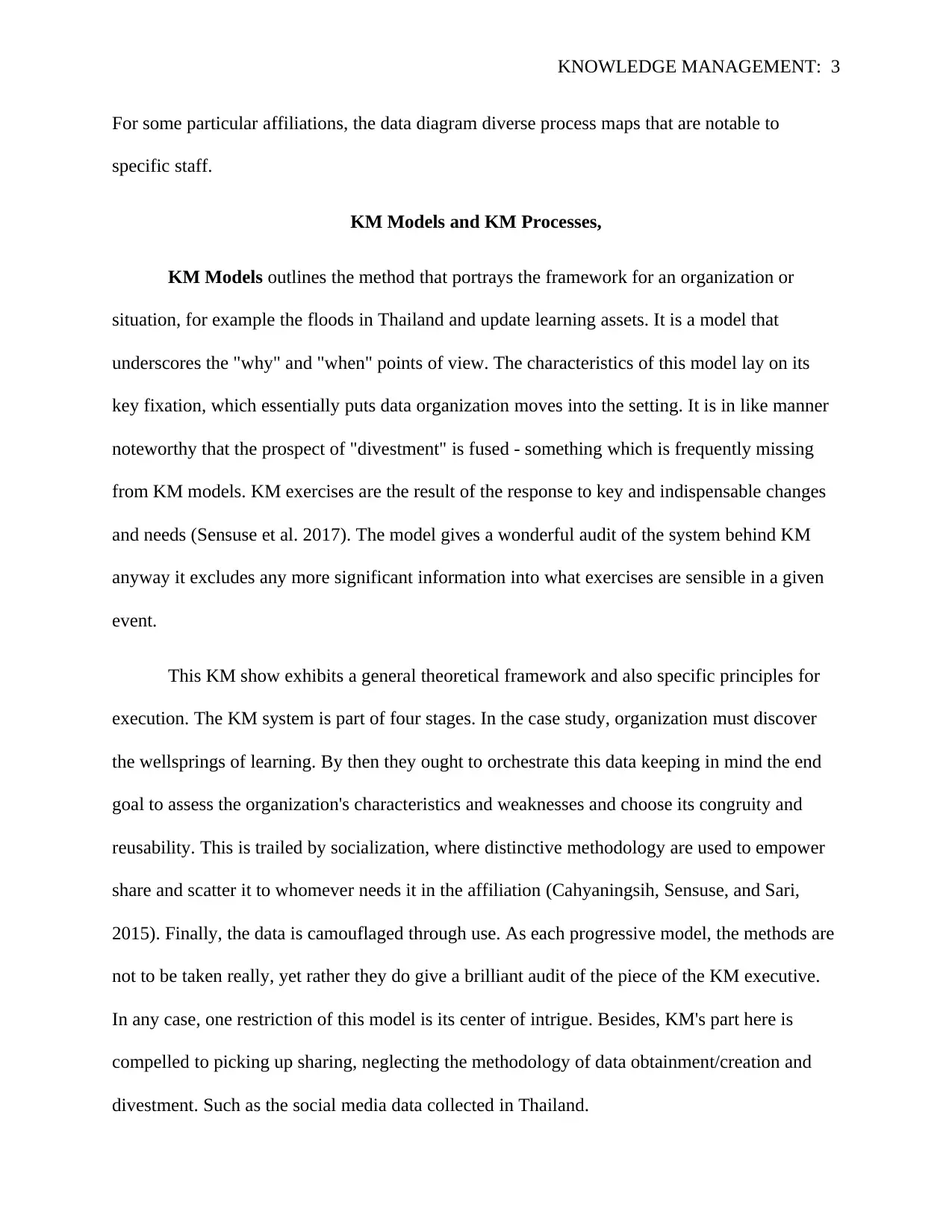
KNOWLEDGE MANAGEMENT: 3
For some particular affiliations, the data diagram diverse process maps that are notable to
specific staff.
KM Models and KM Processes,
KM Models outlines the method that portrays the framework for an organization or
situation, for example the floods in Thailand and update learning assets. It is a model that
underscores the "why" and "when" points of view. The characteristics of this model lay on its
key fixation, which essentially puts data organization moves into the setting. It is in like manner
noteworthy that the prospect of "divestment" is fused - something which is frequently missing
from KM models. KM exercises are the result of the response to key and indispensable changes
and needs (Sensuse et al. 2017). The model gives a wonderful audit of the system behind KM
anyway it excludes any more significant information into what exercises are sensible in a given
event.
This KM show exhibits a general theoretical framework and also specific principles for
execution. The KM system is part of four stages. In the case study, organization must discover
the wellsprings of learning. By then they ought to orchestrate this data keeping in mind the end
goal to assess the organization's characteristics and weaknesses and choose its congruity and
reusability. This is trailed by socialization, where distinctive methodology are used to empower
share and scatter it to whomever needs it in the affiliation (Cahyaningsih, Sensuse, and Sari,
2015). Finally, the data is camouflaged through use. As each progressive model, the methods are
not to be taken really, yet rather they do give a brilliant audit of the piece of the KM executive.
In any case, one restriction of this model is its center of intrigue. Besides, KM's part here is
compelled to picking up sharing, neglecting the methodology of data obtainment/creation and
divestment. Such as the social media data collected in Thailand.
For some particular affiliations, the data diagram diverse process maps that are notable to
specific staff.
KM Models and KM Processes,
KM Models outlines the method that portrays the framework for an organization or
situation, for example the floods in Thailand and update learning assets. It is a model that
underscores the "why" and "when" points of view. The characteristics of this model lay on its
key fixation, which essentially puts data organization moves into the setting. It is in like manner
noteworthy that the prospect of "divestment" is fused - something which is frequently missing
from KM models. KM exercises are the result of the response to key and indispensable changes
and needs (Sensuse et al. 2017). The model gives a wonderful audit of the system behind KM
anyway it excludes any more significant information into what exercises are sensible in a given
event.
This KM show exhibits a general theoretical framework and also specific principles for
execution. The KM system is part of four stages. In the case study, organization must discover
the wellsprings of learning. By then they ought to orchestrate this data keeping in mind the end
goal to assess the organization's characteristics and weaknesses and choose its congruity and
reusability. This is trailed by socialization, where distinctive methodology are used to empower
share and scatter it to whomever needs it in the affiliation (Cahyaningsih, Sensuse, and Sari,
2015). Finally, the data is camouflaged through use. As each progressive model, the methods are
not to be taken really, yet rather they do give a brilliant audit of the piece of the KM executive.
In any case, one restriction of this model is its center of intrigue. Besides, KM's part here is
compelled to picking up sharing, neglecting the methodology of data obtainment/creation and
divestment. Such as the social media data collected in Thailand.
⊘ This is a preview!⊘
Do you want full access?
Subscribe today to unlock all pages.

Trusted by 1+ million students worldwide
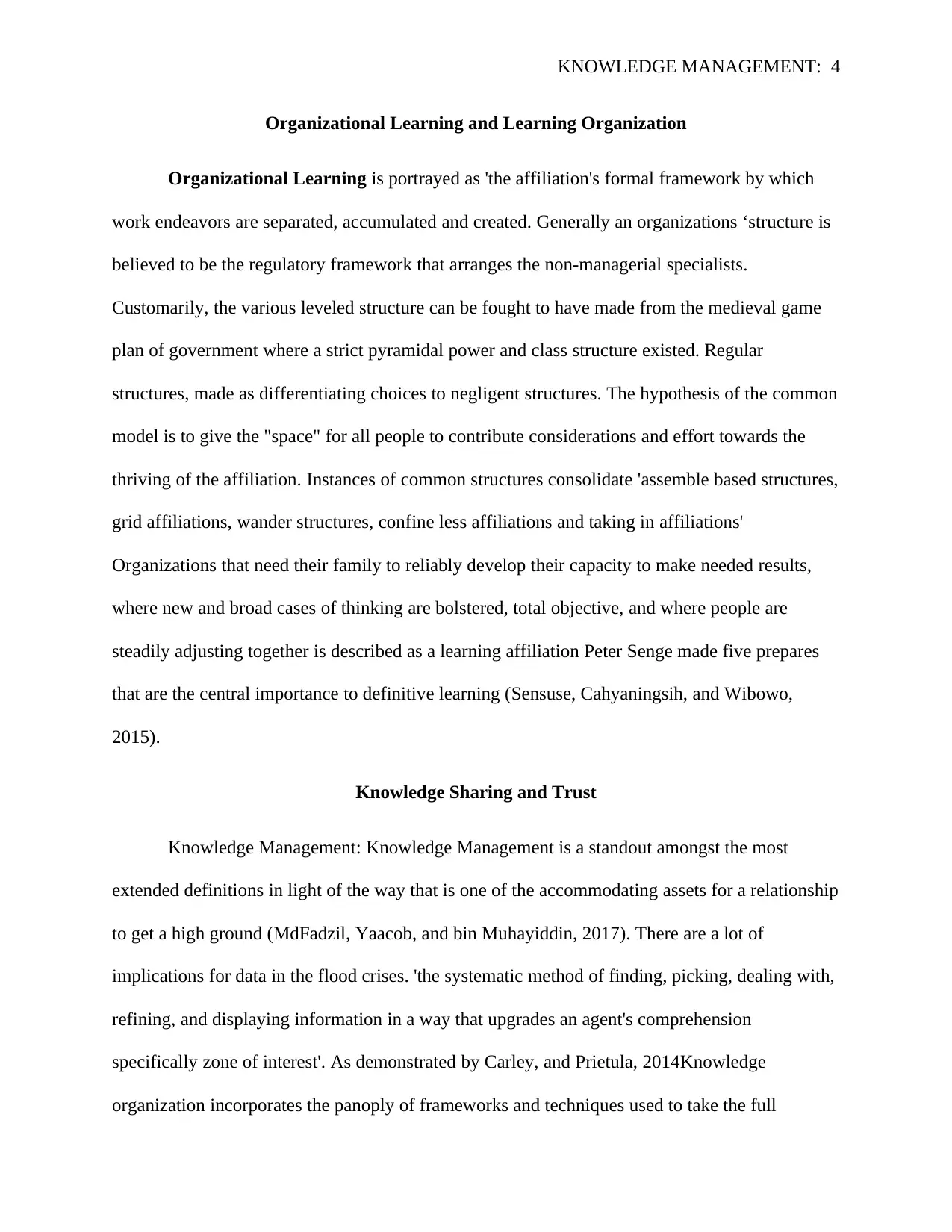
KNOWLEDGE MANAGEMENT: 4
Organizational Learning and Learning Organization
Organizational Learning is portrayed as 'the affiliation's formal framework by which
work endeavors are separated, accumulated and created. Generally an organizations ‘structure is
believed to be the regulatory framework that arranges the non-managerial specialists.
Customarily, the various leveled structure can be fought to have made from the medieval game
plan of government where a strict pyramidal power and class structure existed. Regular
structures, made as differentiating choices to negligent structures. The hypothesis of the common
model is to give the "space" for all people to contribute considerations and effort towards the
thriving of the affiliation. Instances of common structures consolidate 'assemble based structures,
grid affiliations, wander structures, confine less affiliations and taking in affiliations'
Organizations that need their family to reliably develop their capacity to make needed results,
where new and broad cases of thinking are bolstered, total objective, and where people are
steadily adjusting together is described as a learning affiliation Peter Senge made five prepares
that are the central importance to definitive learning (Sensuse, Cahyaningsih, and Wibowo,
2015).
Knowledge Sharing and Trust
Knowledge Management: Knowledge Management is a standout amongst the most
extended definitions in light of the way that is one of the accommodating assets for a relationship
to get a high ground (MdFadzil, Yaacob, and bin Muhayiddin, 2017). There are a lot of
implications for data in the flood crises. 'the systematic method of finding, picking, dealing with,
refining, and displaying information in a way that upgrades an agent's comprehension
specifically zone of interest'. As demonstrated by Carley, and Prietula, 2014Knowledge
organization incorporates the panoply of frameworks and techniques used to take the full
Organizational Learning and Learning Organization
Organizational Learning is portrayed as 'the affiliation's formal framework by which
work endeavors are separated, accumulated and created. Generally an organizations ‘structure is
believed to be the regulatory framework that arranges the non-managerial specialists.
Customarily, the various leveled structure can be fought to have made from the medieval game
plan of government where a strict pyramidal power and class structure existed. Regular
structures, made as differentiating choices to negligent structures. The hypothesis of the common
model is to give the "space" for all people to contribute considerations and effort towards the
thriving of the affiliation. Instances of common structures consolidate 'assemble based structures,
grid affiliations, wander structures, confine less affiliations and taking in affiliations'
Organizations that need their family to reliably develop their capacity to make needed results,
where new and broad cases of thinking are bolstered, total objective, and where people are
steadily adjusting together is described as a learning affiliation Peter Senge made five prepares
that are the central importance to definitive learning (Sensuse, Cahyaningsih, and Wibowo,
2015).
Knowledge Sharing and Trust
Knowledge Management: Knowledge Management is a standout amongst the most
extended definitions in light of the way that is one of the accommodating assets for a relationship
to get a high ground (MdFadzil, Yaacob, and bin Muhayiddin, 2017). There are a lot of
implications for data in the flood crises. 'the systematic method of finding, picking, dealing with,
refining, and displaying information in a way that upgrades an agent's comprehension
specifically zone of interest'. As demonstrated by Carley, and Prietula, 2014Knowledge
organization incorporates the panoply of frameworks and techniques used to take the full
Paraphrase This Document
Need a fresh take? Get an instant paraphrase of this document with our AI Paraphraser
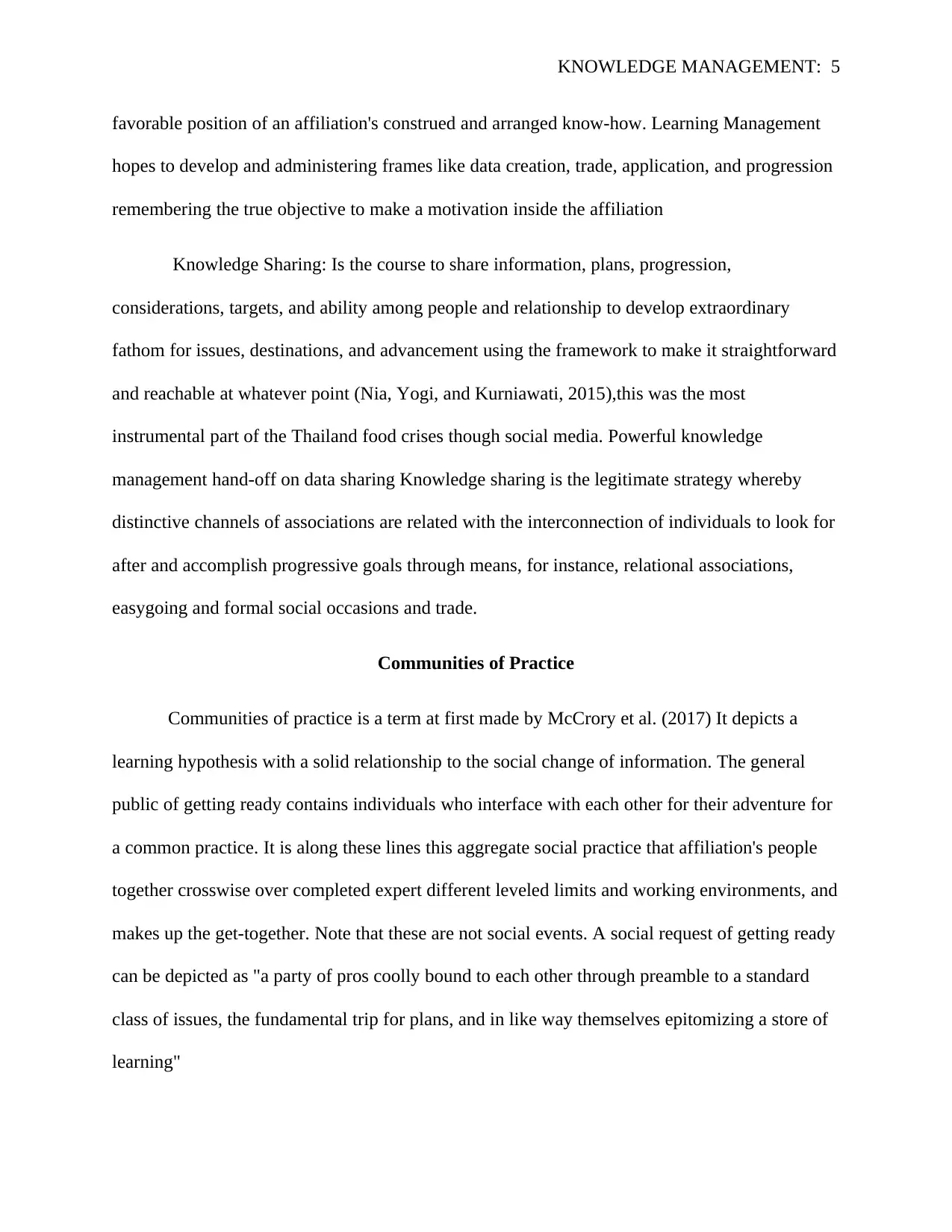
KNOWLEDGE MANAGEMENT: 5
favorable position of an affiliation's construed and arranged know-how. Learning Management
hopes to develop and administering frames like data creation, trade, application, and progression
remembering the true objective to make a motivation inside the affiliation
Knowledge Sharing: Is the course to share information, plans, progression,
considerations, targets, and ability among people and relationship to develop extraordinary
fathom for issues, destinations, and advancement using the framework to make it straightforward
and reachable at whatever point (Nia, Yogi, and Kurniawati, 2015),this was the most
instrumental part of the Thailand food crises though social media. Powerful knowledge
management hand-off on data sharing Knowledge sharing is the legitimate strategy whereby
distinctive channels of associations are related with the interconnection of individuals to look for
after and accomplish progressive goals through means, for instance, relational associations,
easygoing and formal social occasions and trade.
Communities of Practice
Communities of practice is a term at first made by McCrory et al. (2017) It depicts a
learning hypothesis with a solid relationship to the social change of information. The general
public of getting ready contains individuals who interface with each other for their adventure for
a common practice. It is along these lines this aggregate social practice that affiliation's people
together crosswise over completed expert different leveled limits and working environments, and
makes up the get-together. Note that these are not social events. A social request of getting ready
can be depicted as "a party of pros coolly bound to each other through preamble to a standard
class of issues, the fundamental trip for plans, and in like way themselves epitomizing a store of
learning"
favorable position of an affiliation's construed and arranged know-how. Learning Management
hopes to develop and administering frames like data creation, trade, application, and progression
remembering the true objective to make a motivation inside the affiliation
Knowledge Sharing: Is the course to share information, plans, progression,
considerations, targets, and ability among people and relationship to develop extraordinary
fathom for issues, destinations, and advancement using the framework to make it straightforward
and reachable at whatever point (Nia, Yogi, and Kurniawati, 2015),this was the most
instrumental part of the Thailand food crises though social media. Powerful knowledge
management hand-off on data sharing Knowledge sharing is the legitimate strategy whereby
distinctive channels of associations are related with the interconnection of individuals to look for
after and accomplish progressive goals through means, for instance, relational associations,
easygoing and formal social occasions and trade.
Communities of Practice
Communities of practice is a term at first made by McCrory et al. (2017) It depicts a
learning hypothesis with a solid relationship to the social change of information. The general
public of getting ready contains individuals who interface with each other for their adventure for
a common practice. It is along these lines this aggregate social practice that affiliation's people
together crosswise over completed expert different leveled limits and working environments, and
makes up the get-together. Note that these are not social events. A social request of getting ready
can be depicted as "a party of pros coolly bound to each other through preamble to a standard
class of issues, the fundamental trip for plans, and in like way themselves epitomizing a store of
learning"
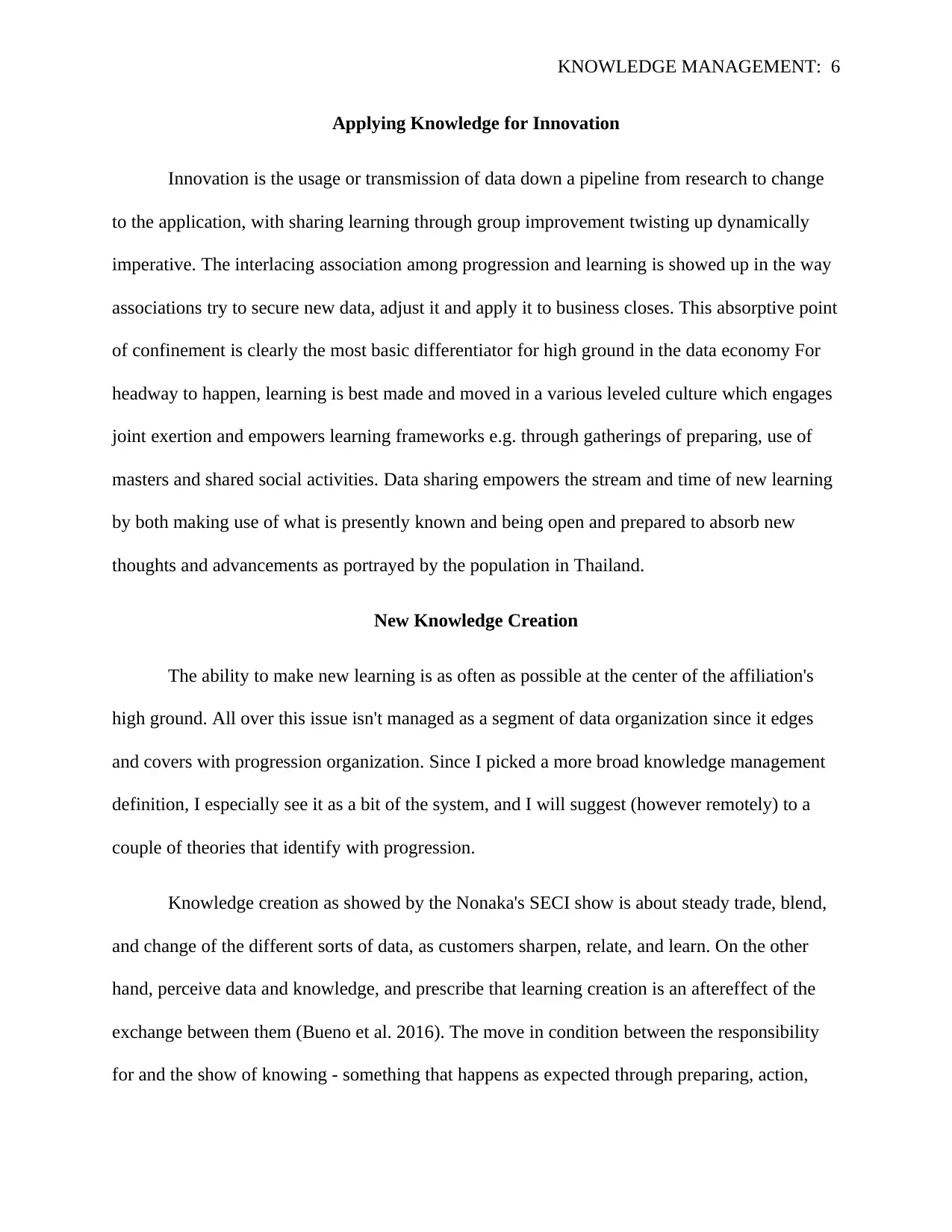
KNOWLEDGE MANAGEMENT: 6
Applying Knowledge for Innovation
Innovation is the usage or transmission of data down a pipeline from research to change
to the application, with sharing learning through group improvement twisting up dynamically
imperative. The interlacing association among progression and learning is showed up in the way
associations try to secure new data, adjust it and apply it to business closes. This absorptive point
of confinement is clearly the most basic differentiator for high ground in the data economy For
headway to happen, learning is best made and moved in a various leveled culture which engages
joint exertion and empowers learning frameworks e.g. through gatherings of preparing, use of
masters and shared social activities. Data sharing empowers the stream and time of new learning
by both making use of what is presently known and being open and prepared to absorb new
thoughts and advancements as portrayed by the population in Thailand.
New Knowledge Creation
The ability to make new learning is as often as possible at the center of the affiliation's
high ground. All over this issue isn't managed as a segment of data organization since it edges
and covers with progression organization. Since I picked a more broad knowledge management
definition, I especially see it as a bit of the system, and I will suggest (however remotely) to a
couple of theories that identify with progression.
Knowledge creation as showed by the Nonaka's SECI show is about steady trade, blend,
and change of the different sorts of data, as customers sharpen, relate, and learn. On the other
hand, perceive data and knowledge, and prescribe that learning creation is an aftereffect of the
exchange between them (Bueno et al. 2016). The move in condition between the responsibility
for and the show of knowing - something that happens as expected through preparing, action,
Applying Knowledge for Innovation
Innovation is the usage or transmission of data down a pipeline from research to change
to the application, with sharing learning through group improvement twisting up dynamically
imperative. The interlacing association among progression and learning is showed up in the way
associations try to secure new data, adjust it and apply it to business closes. This absorptive point
of confinement is clearly the most basic differentiator for high ground in the data economy For
headway to happen, learning is best made and moved in a various leveled culture which engages
joint exertion and empowers learning frameworks e.g. through gatherings of preparing, use of
masters and shared social activities. Data sharing empowers the stream and time of new learning
by both making use of what is presently known and being open and prepared to absorb new
thoughts and advancements as portrayed by the population in Thailand.
New Knowledge Creation
The ability to make new learning is as often as possible at the center of the affiliation's
high ground. All over this issue isn't managed as a segment of data organization since it edges
and covers with progression organization. Since I picked a more broad knowledge management
definition, I especially see it as a bit of the system, and I will suggest (however remotely) to a
couple of theories that identify with progression.
Knowledge creation as showed by the Nonaka's SECI show is about steady trade, blend,
and change of the different sorts of data, as customers sharpen, relate, and learn. On the other
hand, perceive data and knowledge, and prescribe that learning creation is an aftereffect of the
exchange between them (Bueno et al. 2016). The move in condition between the responsibility
for and the show of knowing - something that happens as expected through preparing, action,
⊘ This is a preview!⊘
Do you want full access?
Subscribe today to unlock all pages.

Trusted by 1+ million students worldwide
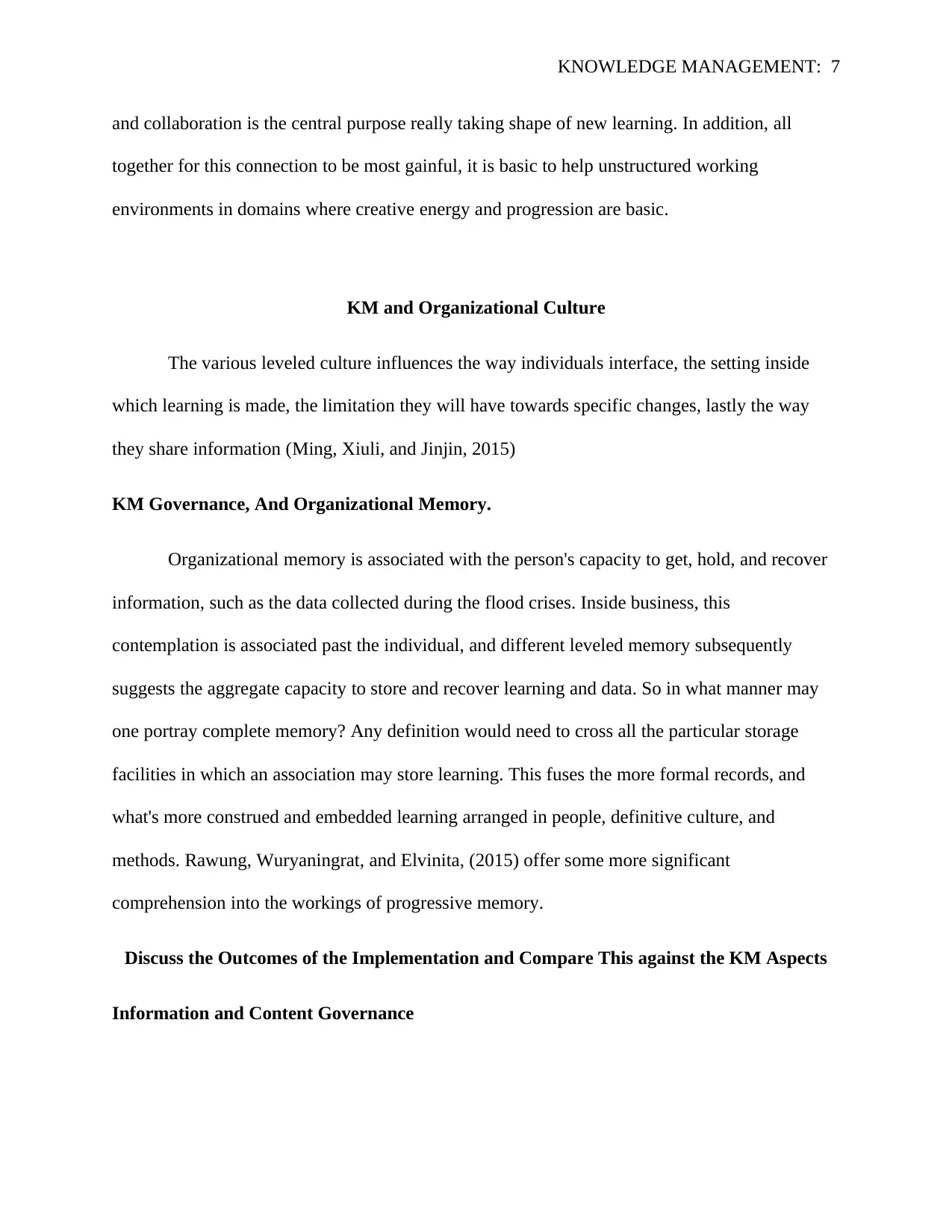
KNOWLEDGE MANAGEMENT: 7
and collaboration is the central purpose really taking shape of new learning. In addition, all
together for this connection to be most gainful, it is basic to help unstructured working
environments in domains where creative energy and progression are basic.
KM and Organizational Culture
The various leveled culture influences the way individuals interface, the setting inside
which learning is made, the limitation they will have towards specific changes, lastly the way
they share information (Ming, Xiuli, and Jinjin, 2015)
KM Governance, And Organizational Memory.
Organizational memory is associated with the person's capacity to get, hold, and recover
information, such as the data collected during the flood crises. Inside business, this
contemplation is associated past the individual, and different leveled memory subsequently
suggests the aggregate capacity to store and recover learning and data. So in what manner may
one portray complete memory? Any definition would need to cross all the particular storage
facilities in which an association may store learning. This fuses the more formal records, and
what's more construed and embedded learning arranged in people, definitive culture, and
methods. Rawung, Wuryaningrat, and Elvinita, (2015) offer some more significant
comprehension into the workings of progressive memory.
Discuss the Outcomes of the Implementation and Compare This against the KM Aspects
Information and Content Governance
and collaboration is the central purpose really taking shape of new learning. In addition, all
together for this connection to be most gainful, it is basic to help unstructured working
environments in domains where creative energy and progression are basic.
KM and Organizational Culture
The various leveled culture influences the way individuals interface, the setting inside
which learning is made, the limitation they will have towards specific changes, lastly the way
they share information (Ming, Xiuli, and Jinjin, 2015)
KM Governance, And Organizational Memory.
Organizational memory is associated with the person's capacity to get, hold, and recover
information, such as the data collected during the flood crises. Inside business, this
contemplation is associated past the individual, and different leveled memory subsequently
suggests the aggregate capacity to store and recover learning and data. So in what manner may
one portray complete memory? Any definition would need to cross all the particular storage
facilities in which an association may store learning. This fuses the more formal records, and
what's more construed and embedded learning arranged in people, definitive culture, and
methods. Rawung, Wuryaningrat, and Elvinita, (2015) offer some more significant
comprehension into the workings of progressive memory.
Discuss the Outcomes of the Implementation and Compare This against the KM Aspects
Information and Content Governance
Paraphrase This Document
Need a fresh take? Get an instant paraphrase of this document with our AI Paraphraser
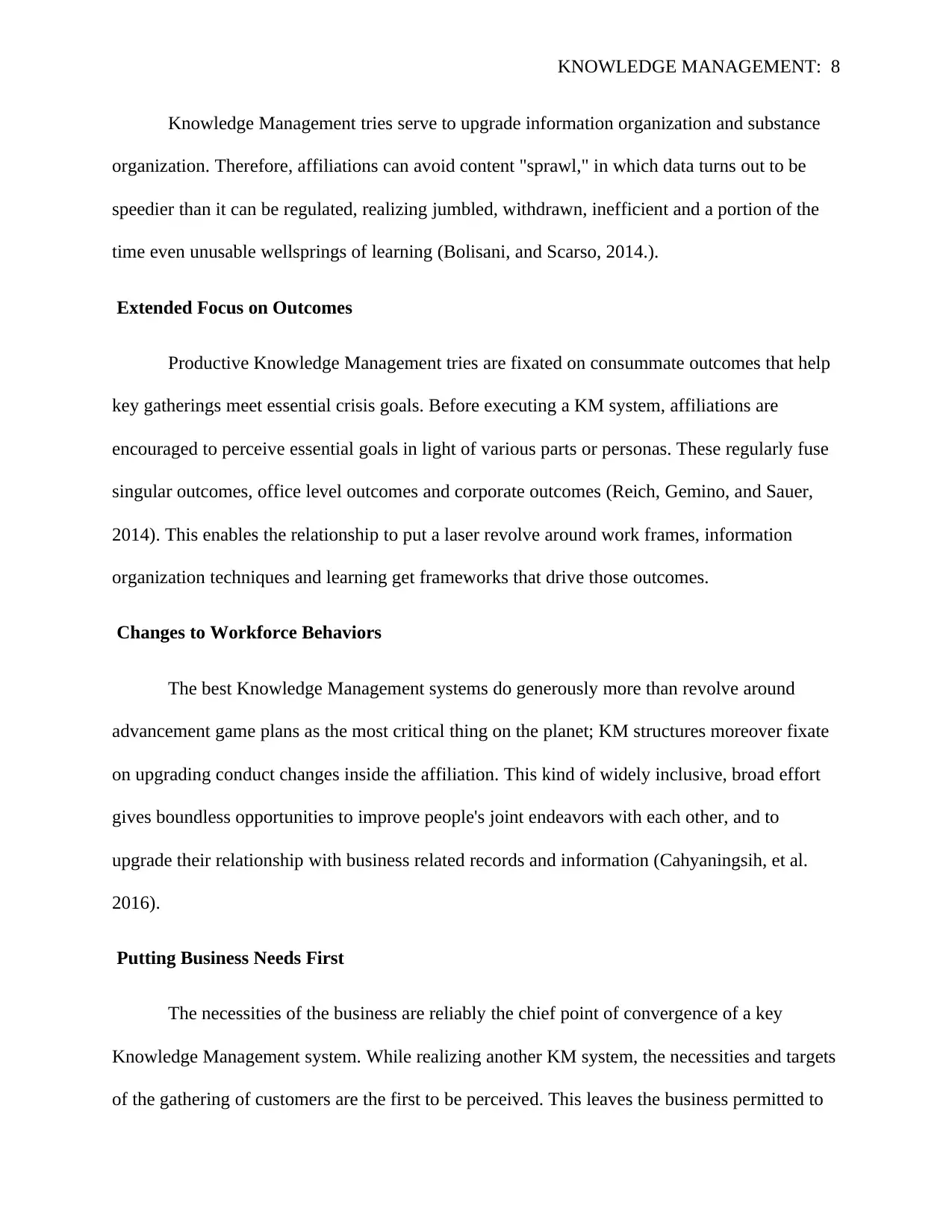
KNOWLEDGE MANAGEMENT: 8
Knowledge Management tries serve to upgrade information organization and substance
organization. Therefore, affiliations can avoid content "sprawl," in which data turns out to be
speedier than it can be regulated, realizing jumbled, withdrawn, inefficient and a portion of the
time even unusable wellsprings of learning (Bolisani, and Scarso, 2014.).
Extended Focus on Outcomes
Productive Knowledge Management tries are fixated on consummate outcomes that help
key gatherings meet essential crisis goals. Before executing a KM system, affiliations are
encouraged to perceive essential goals in light of various parts or personas. These regularly fuse
singular outcomes, office level outcomes and corporate outcomes (Reich, Gemino, and Sauer,
2014). This enables the relationship to put a laser revolve around work frames, information
organization techniques and learning get frameworks that drive those outcomes.
Changes to Workforce Behaviors
The best Knowledge Management systems do generously more than revolve around
advancement game plans as the most critical thing on the planet; KM structures moreover fixate
on upgrading conduct changes inside the affiliation. This kind of widely inclusive, broad effort
gives boundless opportunities to improve people's joint endeavors with each other, and to
upgrade their relationship with business related records and information (Cahyaningsih, et al.
2016).
Putting Business Needs First
The necessities of the business are reliably the chief point of convergence of a key
Knowledge Management system. While realizing another KM system, the necessities and targets
of the gathering of customers are the first to be perceived. This leaves the business permitted to
Knowledge Management tries serve to upgrade information organization and substance
organization. Therefore, affiliations can avoid content "sprawl," in which data turns out to be
speedier than it can be regulated, realizing jumbled, withdrawn, inefficient and a portion of the
time even unusable wellsprings of learning (Bolisani, and Scarso, 2014.).
Extended Focus on Outcomes
Productive Knowledge Management tries are fixated on consummate outcomes that help
key gatherings meet essential crisis goals. Before executing a KM system, affiliations are
encouraged to perceive essential goals in light of various parts or personas. These regularly fuse
singular outcomes, office level outcomes and corporate outcomes (Reich, Gemino, and Sauer,
2014). This enables the relationship to put a laser revolve around work frames, information
organization techniques and learning get frameworks that drive those outcomes.
Changes to Workforce Behaviors
The best Knowledge Management systems do generously more than revolve around
advancement game plans as the most critical thing on the planet; KM structures moreover fixate
on upgrading conduct changes inside the affiliation. This kind of widely inclusive, broad effort
gives boundless opportunities to improve people's joint endeavors with each other, and to
upgrade their relationship with business related records and information (Cahyaningsih, et al.
2016).
Putting Business Needs First
The necessities of the business are reliably the chief point of convergence of a key
Knowledge Management system. While realizing another KM system, the necessities and targets
of the gathering of customers are the first to be perceived. This leaves the business permitted to
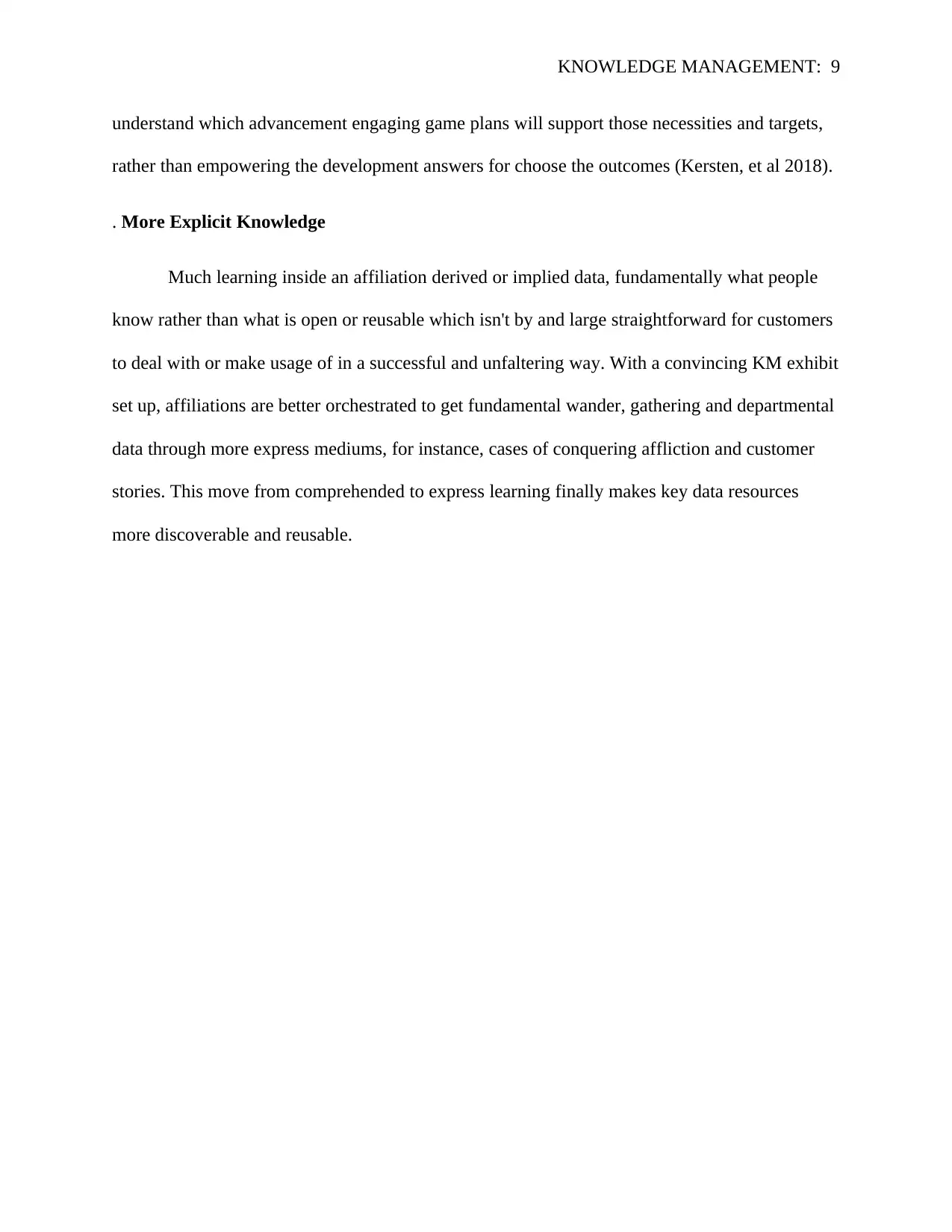
KNOWLEDGE MANAGEMENT: 9
understand which advancement engaging game plans will support those necessities and targets,
rather than empowering the development answers for choose the outcomes (Kersten, et al 2018).
. More Explicit Knowledge
Much learning inside an affiliation derived or implied data, fundamentally what people
know rather than what is open or reusable which isn't by and large straightforward for customers
to deal with or make usage of in a successful and unfaltering way. With a convincing KM exhibit
set up, affiliations are better orchestrated to get fundamental wander, gathering and departmental
data through more express mediums, for instance, cases of conquering affliction and customer
stories. This move from comprehended to express learning finally makes key data resources
more discoverable and reusable.
understand which advancement engaging game plans will support those necessities and targets,
rather than empowering the development answers for choose the outcomes (Kersten, et al 2018).
. More Explicit Knowledge
Much learning inside an affiliation derived or implied data, fundamentally what people
know rather than what is open or reusable which isn't by and large straightforward for customers
to deal with or make usage of in a successful and unfaltering way. With a convincing KM exhibit
set up, affiliations are better orchestrated to get fundamental wander, gathering and departmental
data through more express mediums, for instance, cases of conquering affliction and customer
stories. This move from comprehended to express learning finally makes key data resources
more discoverable and reusable.
⊘ This is a preview!⊘
Do you want full access?
Subscribe today to unlock all pages.

Trusted by 1+ million students worldwide
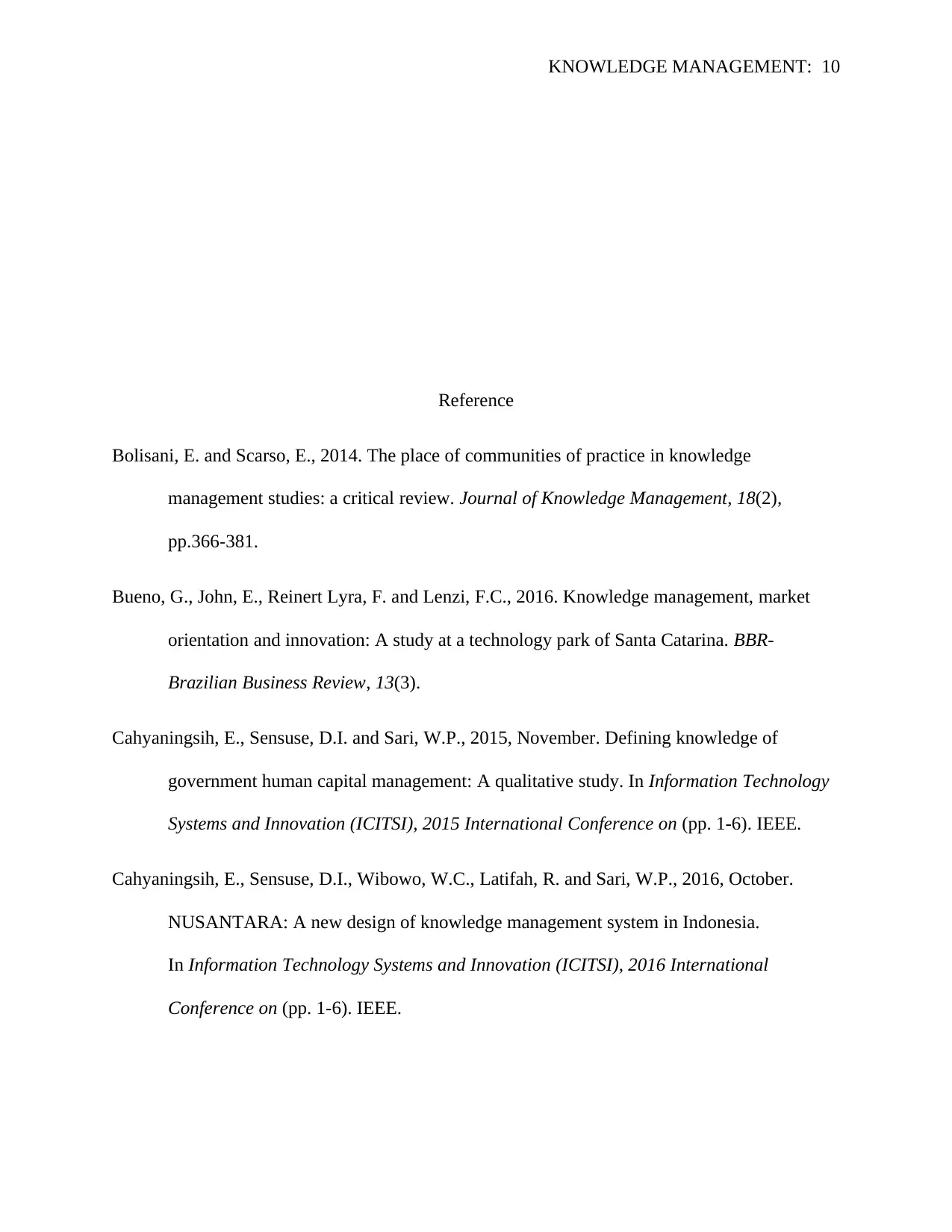
KNOWLEDGE MANAGEMENT: 10
Reference
Bolisani, E. and Scarso, E., 2014. The place of communities of practice in knowledge
management studies: a critical review. Journal of Knowledge Management, 18(2),
pp.366-381.
Bueno, G., John, E., Reinert Lyra, F. and Lenzi, F.C., 2016. Knowledge management, market
orientation and innovation: A study at a technology park of Santa Catarina. BBR-
Brazilian Business Review, 13(3).
Cahyaningsih, E., Sensuse, D.I. and Sari, W.P., 2015, November. Defining knowledge of
government human capital management: A qualitative study. In Information Technology
Systems and Innovation (ICITSI), 2015 International Conference on (pp. 1-6). IEEE.
Cahyaningsih, E., Sensuse, D.I., Wibowo, W.C., Latifah, R. and Sari, W.P., 2016, October.
NUSANTARA: A new design of knowledge management system in Indonesia.
In Information Technology Systems and Innovation (ICITSI), 2016 International
Conference on (pp. 1-6). IEEE.
Reference
Bolisani, E. and Scarso, E., 2014. The place of communities of practice in knowledge
management studies: a critical review. Journal of Knowledge Management, 18(2),
pp.366-381.
Bueno, G., John, E., Reinert Lyra, F. and Lenzi, F.C., 2016. Knowledge management, market
orientation and innovation: A study at a technology park of Santa Catarina. BBR-
Brazilian Business Review, 13(3).
Cahyaningsih, E., Sensuse, D.I. and Sari, W.P., 2015, November. Defining knowledge of
government human capital management: A qualitative study. In Information Technology
Systems and Innovation (ICITSI), 2015 International Conference on (pp. 1-6). IEEE.
Cahyaningsih, E., Sensuse, D.I., Wibowo, W.C., Latifah, R. and Sari, W.P., 2016, October.
NUSANTARA: A new design of knowledge management system in Indonesia.
In Information Technology Systems and Innovation (ICITSI), 2016 International
Conference on (pp. 1-6). IEEE.
Paraphrase This Document
Need a fresh take? Get an instant paraphrase of this document with our AI Paraphraser
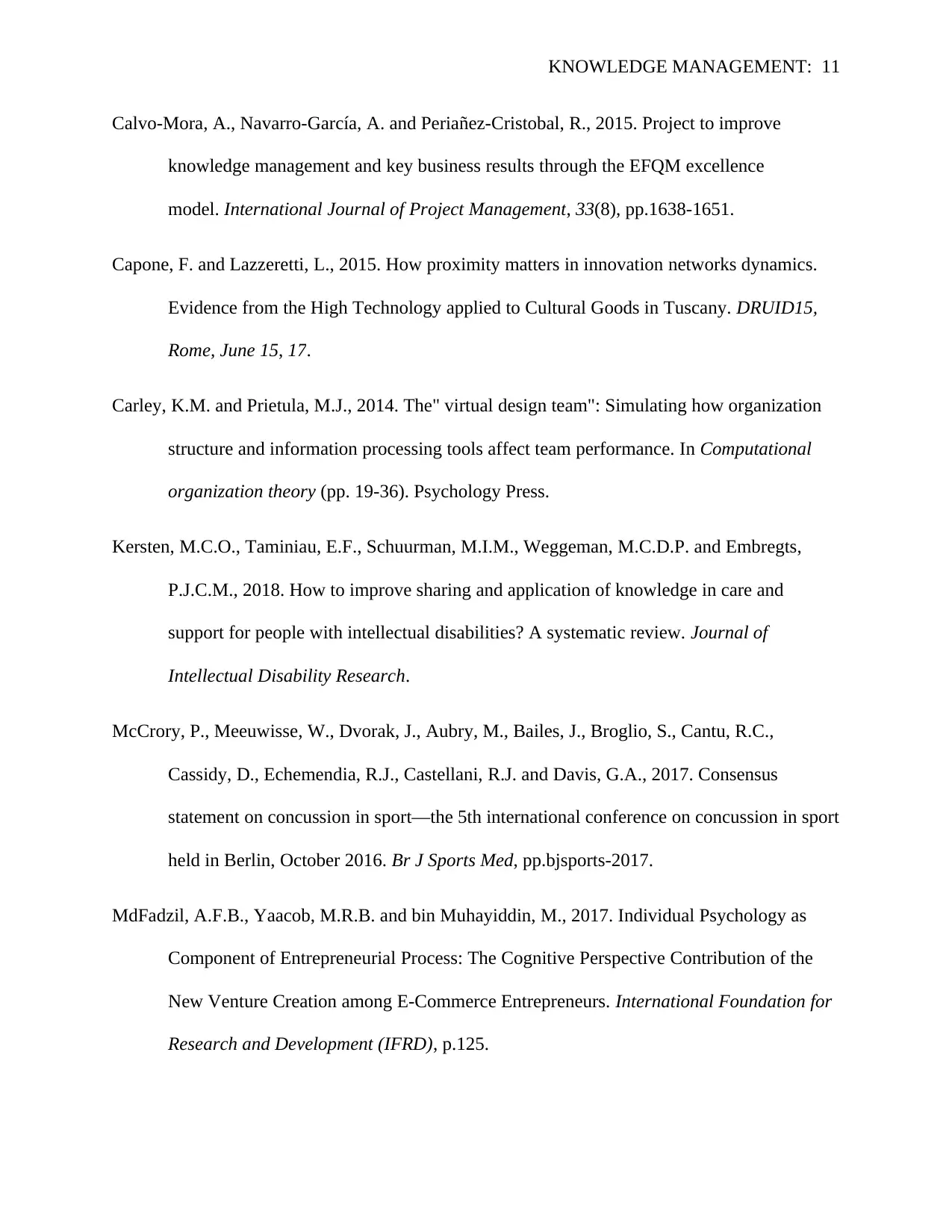
KNOWLEDGE MANAGEMENT: 11
Calvo-Mora, A., Navarro-García, A. and Periañez-Cristobal, R., 2015. Project to improve
knowledge management and key business results through the EFQM excellence
model. International Journal of Project Management, 33(8), pp.1638-1651.
Capone, F. and Lazzeretti, L., 2015. How proximity matters in innovation networks dynamics.
Evidence from the High Technology applied to Cultural Goods in Tuscany. DRUID15,
Rome, June 15, 17.
Carley, K.M. and Prietula, M.J., 2014. The" virtual design team": Simulating how organization
structure and information processing tools affect team performance. In Computational
organization theory (pp. 19-36). Psychology Press.
Kersten, M.C.O., Taminiau, E.F., Schuurman, M.I.M., Weggeman, M.C.D.P. and Embregts,
P.J.C.M., 2018. How to improve sharing and application of knowledge in care and
support for people with intellectual disabilities? A systematic review. Journal of
Intellectual Disability Research.
McCrory, P., Meeuwisse, W., Dvorak, J., Aubry, M., Bailes, J., Broglio, S., Cantu, R.C.,
Cassidy, D., Echemendia, R.J., Castellani, R.J. and Davis, G.A., 2017. Consensus
statement on concussion in sport—the 5th international conference on concussion in sport
held in Berlin, October 2016. Br J Sports Med, pp.bjsports-2017.
MdFadzil, A.F.B., Yaacob, M.R.B. and bin Muhayiddin, M., 2017. Individual Psychology as
Component of Entrepreneurial Process: The Cognitive Perspective Contribution of the
New Venture Creation among E-Commerce Entrepreneurs. International Foundation for
Research and Development (IFRD), p.125.
Calvo-Mora, A., Navarro-García, A. and Periañez-Cristobal, R., 2015. Project to improve
knowledge management and key business results through the EFQM excellence
model. International Journal of Project Management, 33(8), pp.1638-1651.
Capone, F. and Lazzeretti, L., 2015. How proximity matters in innovation networks dynamics.
Evidence from the High Technology applied to Cultural Goods in Tuscany. DRUID15,
Rome, June 15, 17.
Carley, K.M. and Prietula, M.J., 2014. The" virtual design team": Simulating how organization
structure and information processing tools affect team performance. In Computational
organization theory (pp. 19-36). Psychology Press.
Kersten, M.C.O., Taminiau, E.F., Schuurman, M.I.M., Weggeman, M.C.D.P. and Embregts,
P.J.C.M., 2018. How to improve sharing and application of knowledge in care and
support for people with intellectual disabilities? A systematic review. Journal of
Intellectual Disability Research.
McCrory, P., Meeuwisse, W., Dvorak, J., Aubry, M., Bailes, J., Broglio, S., Cantu, R.C.,
Cassidy, D., Echemendia, R.J., Castellani, R.J. and Davis, G.A., 2017. Consensus
statement on concussion in sport—the 5th international conference on concussion in sport
held in Berlin, October 2016. Br J Sports Med, pp.bjsports-2017.
MdFadzil, A.F.B., Yaacob, M.R.B. and bin Muhayiddin, M., 2017. Individual Psychology as
Component of Entrepreneurial Process: The Cognitive Perspective Contribution of the
New Venture Creation among E-Commerce Entrepreneurs. International Foundation for
Research and Development (IFRD), p.125.
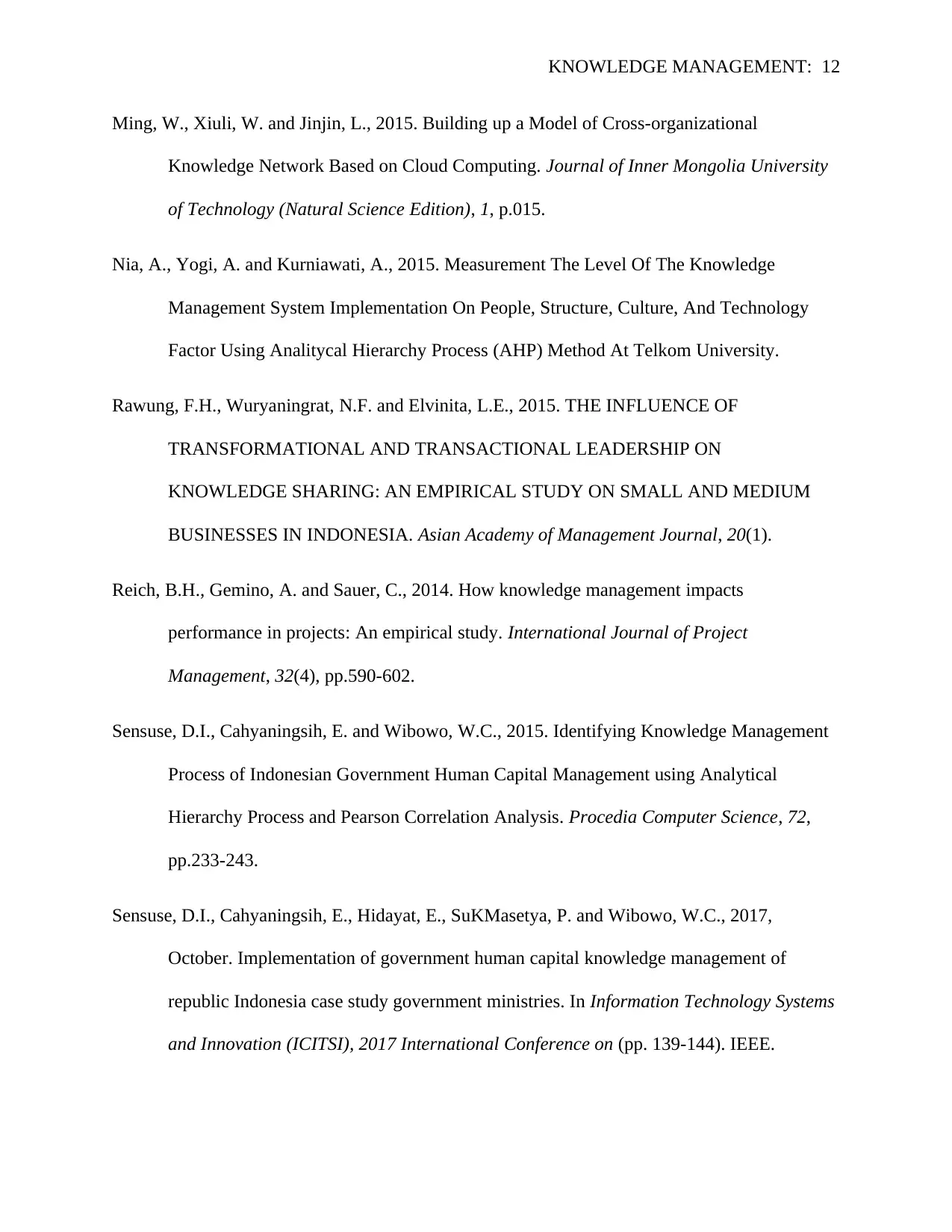
KNOWLEDGE MANAGEMENT: 12
Ming, W., Xiuli, W. and Jinjin, L., 2015. Building up a Model of Cross-organizational
Knowledge Network Based on Cloud Computing. Journal of Inner Mongolia University
of Technology (Natural Science Edition), 1, p.015.
Nia, A., Yogi, A. and Kurniawati, A., 2015. Measurement The Level Of The Knowledge
Management System Implementation On People, Structure, Culture, And Technology
Factor Using Analitycal Hierarchy Process (AHP) Method At Telkom University.
Rawung, F.H., Wuryaningrat, N.F. and Elvinita, L.E., 2015. THE INFLUENCE OF
TRANSFORMATIONAL AND TRANSACTIONAL LEADERSHIP ON
KNOWLEDGE SHARING: AN EMPIRICAL STUDY ON SMALL AND MEDIUM
BUSINESSES IN INDONESIA. Asian Academy of Management Journal, 20(1).
Reich, B.H., Gemino, A. and Sauer, C., 2014. How knowledge management impacts
performance in projects: An empirical study. International Journal of Project
Management, 32(4), pp.590-602.
Sensuse, D.I., Cahyaningsih, E. and Wibowo, W.C., 2015. Identifying Knowledge Management
Process of Indonesian Government Human Capital Management using Analytical
Hierarchy Process and Pearson Correlation Analysis. Procedia Computer Science, 72,
pp.233-243.
Sensuse, D.I., Cahyaningsih, E., Hidayat, E., SuKMasetya, P. and Wibowo, W.C., 2017,
October. Implementation of government human capital knowledge management of
republic Indonesia case study government ministries. In Information Technology Systems
and Innovation (ICITSI), 2017 International Conference on (pp. 139-144). IEEE.
Ming, W., Xiuli, W. and Jinjin, L., 2015. Building up a Model of Cross-organizational
Knowledge Network Based on Cloud Computing. Journal of Inner Mongolia University
of Technology (Natural Science Edition), 1, p.015.
Nia, A., Yogi, A. and Kurniawati, A., 2015. Measurement The Level Of The Knowledge
Management System Implementation On People, Structure, Culture, And Technology
Factor Using Analitycal Hierarchy Process (AHP) Method At Telkom University.
Rawung, F.H., Wuryaningrat, N.F. and Elvinita, L.E., 2015. THE INFLUENCE OF
TRANSFORMATIONAL AND TRANSACTIONAL LEADERSHIP ON
KNOWLEDGE SHARING: AN EMPIRICAL STUDY ON SMALL AND MEDIUM
BUSINESSES IN INDONESIA. Asian Academy of Management Journal, 20(1).
Reich, B.H., Gemino, A. and Sauer, C., 2014. How knowledge management impacts
performance in projects: An empirical study. International Journal of Project
Management, 32(4), pp.590-602.
Sensuse, D.I., Cahyaningsih, E. and Wibowo, W.C., 2015. Identifying Knowledge Management
Process of Indonesian Government Human Capital Management using Analytical
Hierarchy Process and Pearson Correlation Analysis. Procedia Computer Science, 72,
pp.233-243.
Sensuse, D.I., Cahyaningsih, E., Hidayat, E., SuKMasetya, P. and Wibowo, W.C., 2017,
October. Implementation of government human capital knowledge management of
republic Indonesia case study government ministries. In Information Technology Systems
and Innovation (ICITSI), 2017 International Conference on (pp. 139-144). IEEE.
⊘ This is a preview!⊘
Do you want full access?
Subscribe today to unlock all pages.

Trusted by 1+ million students worldwide
1 out of 12
Related Documents
Your All-in-One AI-Powered Toolkit for Academic Success.
+13062052269
info@desklib.com
Available 24*7 on WhatsApp / Email
![[object Object]](/_next/static/media/star-bottom.7253800d.svg)
Unlock your academic potential
Copyright © 2020–2026 A2Z Services. All Rights Reserved. Developed and managed by ZUCOL.





